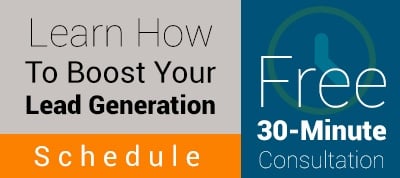
If you're using SMART goals for your inbound marketing, you're probably in the minority.
Many executives we talk to base their inbound marketing strategies on their available budget or even worse, on expectations that aren't based on reality. Any inbound marketing tactic you use can be measured, so it only makes sense to analyze results to optimize your strategy.
Get A Step-By-Step Guide To Setting Inbound Marketing SMART Goals
Remember, SMART goals are:
- Specific
- Measureabe
- Attainable
- Relevant
- Time-Related
Of the five elements that make up SMART goals, Attainable is the one that most executives miss the mark on. And I understand why - we're measured on results and demand them from those who work with us. But if the goals you set aren't attainable, you're setting yourself up for failure. And worse, you're not taking steps to help you hit those stretch goals.
What should you expect from inbound marketing?
The answer to this question depends on several factors, but the reality is that it will take 6-12 months to develop a healthy flow of organic traffic and leads when you start inbound marketing. It takes this long to develop domain authority with Google and to build social media audiences, period. If someone tells you they can get organic results in 30 days, my advice would be to highly skeptical.
Much of the ramp-up time depends on your industry. In a highly competitive industry like marketing, it's extremely hard to build organic traffic in a short period of time. There are literally thousands of digital marketing agencies creating content and there are only 10 organic search results on the first page of a Google search - you do the math. But if you're in a less competitive industry, you may be able to jump the curve and start getting results earlier.
Does this mean you shouldn't invest in inbound marketing because it will take too long to get results. In my opinion, the answer is a resounding no:
- Search engine queries and visits to business websites are the top two ways that B2B buyers conduct pre-purchase research and draw up their short lists of potential vendors. If you want to sell to modern B2B buyers, you have to create content and generate leads with inbound marketing tactics. Doubling down on cold calls just isn't the answer.
- If you're not using inbound marketing in your sales process, you can bet that your competition is. The longer you wait to start, the bigger the jump they have on you becomes.
In my mind, one of the biggest marketing paradoxes is that you should increase your investment when your budget is most challenged. The best time to invest in marketing is when you lose a big customer. You need to replace that revenue and to do that, you need to invest in marketing.
So what can you do to speed up the results of your inbound marketing?Ideas to speed up your inbound marketing results
One way to look at inbound marketing is that you're selling to people you don't know. They find you when they're looking for information on how to best solve the problems they face (and that you solve.) You will note that we mentioned organic traffic in the paragraphs above. Organic traffic is website traffic that comes to your site when they search based on keywords in Google. Some of the strategies to speed up results are designed to be smart about driving organic traffic and others are based on using non-organic traffic searches. Here are some strategies to speed up your inbound marketing results.
Create content based around long-tail keywords
Short-tail keywords are 1-2 word phrases that describe an industry, product or service - think inbound marketing. They are very difficult to rank for and it's hard to judge the intent of the person who searches using short-tail keywords.
Long-tail keywords are longer phrases that usually include a short-tail keyword - think inbound marketing SMART goals. Long-tail keyword phrases are easier to rank for and it's much easier to have an idea of the intent of the searcher. If someone is searching for inbound marketing SMART goals, they probably either practice inbound marketing or are considering it.
Creating content based around long-tail keywords based on the industries you serve and specific questions people have is a great way to speed up your inbound marketing results. It will also drive better-qualified traffic to your content.
How To Integrate Your Keyword Strategy Into Your Sales Process
Promote your content
Creating good educational content that your target audience finds relevant is just the first step in your content marketing process. You know, if a tree falls in a forest.... A second and equally important step in your content marketing process is to promote your content.
- Promote your content on social media channels. Many businesses promote their content on the company social media profiles and that's it. Unless you're a big enterprise company, most of your employees have more LinkedIn contacts that your company has followers. It's a good idea to let your people know when you've published new content and ask them to share it on their personal social channels. We had one customer take this approach and it gave them a 33% lift on visits to that piece of content.
- Ask vendors, partners and friends to share your content. Having third-parties promoting your content gives it credibility and sends signals to the search engines that your content is good. Ask your vendors, partners and associates to share your great content. But make sure that it's shareworthy and something that will make them look good when they share it.
- Answers questions on Quora and other Q/A sites. If you're creating content that answers the questions you hear from prospects and customers, answer questions on Quora with it. Don't answer the question by sharing a link - write a paragraph or two summarizing your post as an answer and include a link for people who want a deeper dive.
Use Pay-Per-Click Advertising (Google Adwords)
PPC advertising is a good way to drive traffic to your site while your building a steady flow or organic leads and visitors. If you don't know what you're doing, you can burn a lot of money really quickly with PPC advertising. Here are some quick tips for PPC advertising.
- Send your PPC traffic to a landing page. Many novice PPC advertisers send their PPC traffic to their home page. This is a waste of money, because you're likely not collecting any information on the clicks you're buying. Send your PPC traffic to a landing page specifically designed for an eBook offer, free consultation or other premium content offer. The idea is to have an offer that logically flows from the copy in your ad and entices the visitor to exchange contact information for the offer.
- Choose keywords with a high level of buying intent. In order to maximize the ROI on your PPC investment, advertise for keywords that signal a high level of buying intent. For example, rather than choose keywords like accounting best practices, choose top accountants in Boston. If someone is searching for accounting best practices, you don't have much of an idea what their intent is. But if someone is looking for top accountants in Boston, there's a good chance that they're looking to hire a accountant.
- Use purpose-built PPC software to manage your campaigns. Software like HubSpot's Ads Add-On or Wordstream take a lot of the guesswork out of your PPC strategy. If you're going to invest in PPC, invest in tools that will optimize your ROI.
Use Social Media Advertising
LinkedIn Sponsored Updates are an excellent option for professional services businesses. Depending on your business, Facebook and Twitter ads may also be a good option. Many of the same best practices discussed for PPC advertising apply to social media ads. However, you can target your advertising audience much more narrowly with social advertising.
One to understand about both PPC and social media advertising is that you are renting the audience - the second you stop paying rent, the audience goes away. You own organic traffic created by inbound marketing tactics; as long as you keep producing content, that audience will keep coming back.
SMART goals are a fundamental basis of any good inbound marketing program. If you're not using them, you're not taking advantage of the inherently measurable nature of inbound marketing. But if the goals you set aren't based in reality, you're setting yourself up for failure and wasting a good opportunity for your business.







